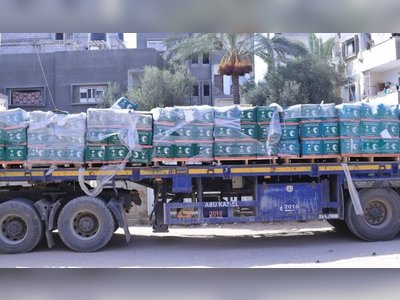
Famine Declared in Parts of Gaza by UN-Backed Initiative
Malnutrition threatens lives of 132,000 children under five; deaths from starvation rise.
A United Nations-backed initiative has reported that parts of the Gaza Strip are officially experiencing famine, with the situation expected to worsen.
According to the Integrated Food Security Phase Classification (IPC) report released on Friday, famine has been confirmed in the Gaza Governorate, which includes Gaza City.
The IPC report highlights that malnutrition poses a significant threat to the lives of 132,000 children under five years old through June 2026, with 41,000 cases classified as severe.
The situation in Gaza has deteriorated over nearly two years of war, during which Israel has at times restricted or cut off aid entry into the besieged enclave.
The report details how some individuals have died from starvation while others have lost their lives attempting to access aid at distribution sites managed by the contested Gaza Humanitarian Foundation (GHF).
The GHF was established to replace a UN system that Israel has long criticized.
In response to the IPC report, the Israeli agency responsible for distributing aid into Gaza, COGAT, rejected its findings.
COGAT claims that the report is based on 'partial, biased data and superficial information originating from Hamas' and accuses it of disregarding extensive humanitarian efforts in Gaza.
COGAT further asserts that over 100,000 trucks of aid have been delivered to Gaza since the conflict began, including essential supplies such as food, medical equipment, fuel, and shelter materials.
However, various aid organizations, the UN, and distressing accounts and images emanating from Gaza provide a different narrative.
US President Donald Trump has corroborated these claims by stating that there is 'real starvation' in Gaza, contradicting assertions made by Israeli Prime Minister Benjamin Netanyahu who maintains that starvation is not an issue.
Tom Fletcher, the UN emergency relief coordinator, emphasized the gravity of the situation during a news briefing on Friday.
He urged global attention to the IPC report and called for action in light of the preventable nature of this crisis: “Read it in sorrow and anger, not as words and numbers but names and lives.
Be in no doubt that this irrefutable testimony is a famine - the Gaza famine - one that we could have prevented if we were allowed.”
The plight of those in Gaza has garnered substantial media attention, including from CNN which reported on the death of 4-year-old Razan Abu Zaher who succumbed to malnutrition complications.
Additional deaths attributed to starvation have been recorded, bringing the total number to 271, with 112 of these being children.
The IPC system utilizes a five-phase scale to measure food insecurity, and famine is only declared if specific thresholds are met.
These criteria include: at least 20% of all households facing extreme food shortages, 30% or more of children suffering from acute malnutrition based on body measurements, at least 15% of children experiencing severe malnutrition, and a daily mortality rate of at least two in every 10,000 people due to starvation or the combination of malnutrition and disease.
According to the Integrated Food Security Phase Classification (IPC) report released on Friday, famine has been confirmed in the Gaza Governorate, which includes Gaza City.
The IPC report highlights that malnutrition poses a significant threat to the lives of 132,000 children under five years old through June 2026, with 41,000 cases classified as severe.
The situation in Gaza has deteriorated over nearly two years of war, during which Israel has at times restricted or cut off aid entry into the besieged enclave.
The report details how some individuals have died from starvation while others have lost their lives attempting to access aid at distribution sites managed by the contested Gaza Humanitarian Foundation (GHF).
The GHF was established to replace a UN system that Israel has long criticized.
In response to the IPC report, the Israeli agency responsible for distributing aid into Gaza, COGAT, rejected its findings.
COGAT claims that the report is based on 'partial, biased data and superficial information originating from Hamas' and accuses it of disregarding extensive humanitarian efforts in Gaza.
COGAT further asserts that over 100,000 trucks of aid have been delivered to Gaza since the conflict began, including essential supplies such as food, medical equipment, fuel, and shelter materials.
However, various aid organizations, the UN, and distressing accounts and images emanating from Gaza provide a different narrative.
US President Donald Trump has corroborated these claims by stating that there is 'real starvation' in Gaza, contradicting assertions made by Israeli Prime Minister Benjamin Netanyahu who maintains that starvation is not an issue.
Tom Fletcher, the UN emergency relief coordinator, emphasized the gravity of the situation during a news briefing on Friday.
He urged global attention to the IPC report and called for action in light of the preventable nature of this crisis: “Read it in sorrow and anger, not as words and numbers but names and lives.
Be in no doubt that this irrefutable testimony is a famine - the Gaza famine - one that we could have prevented if we were allowed.”
The plight of those in Gaza has garnered substantial media attention, including from CNN which reported on the death of 4-year-old Razan Abu Zaher who succumbed to malnutrition complications.
Additional deaths attributed to starvation have been recorded, bringing the total number to 271, with 112 of these being children.
The IPC system utilizes a five-phase scale to measure food insecurity, and famine is only declared if specific thresholds are met.
These criteria include: at least 20% of all households facing extreme food shortages, 30% or more of children suffering from acute malnutrition based on body measurements, at least 15% of children experiencing severe malnutrition, and a daily mortality rate of at least two in every 10,000 people due to starvation or the combination of malnutrition and disease.










